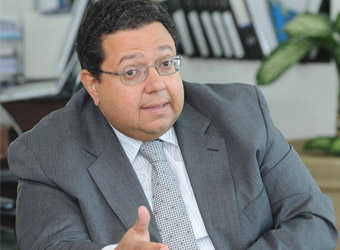Egypt’s outreach to other nations, including Russia, isn’t a consequence of fraying ties with the U.S., nor is it meant to supplant relations with Washington, Egypt’s deputy premier said.
Egypt has had “excellent” relationships with the West, including the U.S., for decades and Cairo’s push to deepen ties elsewhere shouldn’t be seen as a “zero-sum game,” Ziad Bahaa El-Din, who also serves as International Cooperation Minister, said in an interview today.
After the ouster of President Mohamed Morsi in July, Egypt’s government had to fend off criticism over a crackdown on the Muslim Brotherhood and allied Islamists that left more than 1,000 dead and hundreds imprisoned. Morsi is standing trial on charges of inciting violence that led to the killing of protesters outside a presidential palace last year.
“There was a sense that the transition was grossly misunderstood and misrepresented in the U.S.,” Bahaa El-Din said in his office in Cairo. “It’s a glitch in a 30-year relationship.”
Egypt’s new government has veered from friendships forged with Qatar and Turkey under Morsi, and found new financial backers in Saudi Arabia, the United Arab Emirates and Kuwait, which have pledged more than $12 billion in aid.
Egyptian officials have said the funds from the three Gulf nations are critical in pushing ahead with stimulus plans aimed at reviving an economy limping along at its slowest pace in about two decades.
No Urgency
The money has offered Egypt a cushion at a time when foreign reserves are still about 50 percent below their end-December 2010 levels and after several bids to secure a loan from theInternational Monetary Fund ended without an agreement. Bahaa El-Din said there wasn’t “an immediate pressing urgency to enter into an agreement” with the IMF.
Egypt also has begun reaching out to Russia, reflecting a revival of a relationship born of the socialist fervor of the late 1950s and 1960s under then-President Gamal Abdel Nasser.
Bahaa El-Din spoke on the same day that Russian Defense Minister Sergei Shoigu and Foreign Minister Sergei Lavrov were in Cairo to meet their counterparts Abdelfatah al-Seesi and Nabil Fahmy, the highest-level contact between the two countries since the ouster of Morsi.
“We look forward to strong, stable and continuing relations with Russia,” Fahmy said today.
‘Temporary Measures’
The U.S., which had been providing about $1.5 billion yearly in economic and military aid that came as a byproduct of the Camp David peace deal, last month suspended some military aid to Egypt, including $260 million in cash and deliveries of F-16 fighter jets, helicopters and tanks, in an effort to prod the North African country toward democracy.
“I look at the suspension or restrictions on aid and other things certainly as temporary measures,” Bahaa El-Din said.
Russia is negotiating its biggest weapons deals with Egypt since the Cold War as it seeks to capitalize on U.S. President Barack Obama’s decision to cut defense aid. Egypt is seeking as much as $2 billion of Russian weaponry, including MiG-29 fighter planes, air-defense systems and anti-tank missiles, said Ruslan Pukhov, a member of the Russian Defense Ministry’s advisory board.
Egypt is seeking financing from an unidentified Persian Gulf country to buy the arms, Palestinian newspaper Dunia al-Watan reported Nov. 6, citing unidentified people familiar with the matter.
Morsi Protest
Egypt received Soviet military assistance during the 1973 Arab-Israeli war, and the Soviets financed infrastructure projects such as the Aswan Dam to irrigate land and supply electricity.
The ties had weakened after Nasser’s death in 1970, when the Arab nationalist was succeeded by Anwar Sadat, who set the regional power on a pro-U.S. track that accelerated under Hosni Mubarak. Popular protests toppled Mubarak in 2011 as the so-called Arab Spring swept the region.
Bahaa El-Din said Egypt is pushing ahead with a transition to democracy — a plan that sees the amending of the now-suspended constitution, a referendum on the new charter and then parliamentary and presidential elections by early next year.
The process has been clouded by the unrest that’s so far served to discourage foreign investors and tourists. Morsi’s trial, which began Nov. 4, has sharpened the divide in the nation, with the Islamist challenging the court’s legitimacy and maintaining he’s still president.
The claims were repeated yesterday in a statement by Morsi read by his lawyers, in which he said stability wouldn’t return until the “coup” was reversed — remarks which Bahaa El-Din described as a “direct threat.”
“It’s a threat to continue to incite violence and it’s one which will not be accepted by anybody around here, neither in the government nor outside,” Bahaa El-Din said. Egyptians “are extremely keen on returning to a state of normality.”
Source: Bloomberg



